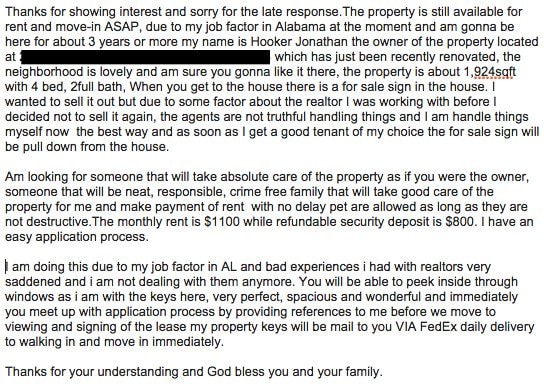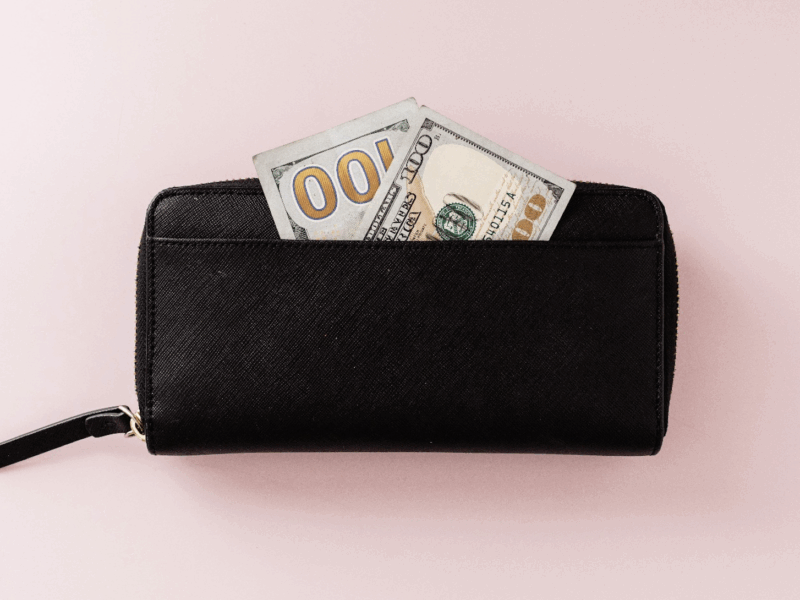Sadly, phone and online scams are all around us. According to the FTC, nearly 11% of adults in the United States were scammed or paid for fraudulent products in 2011 alone. Yes, that many people!
 In fact, according to Ultrascan AGI, nearly $13 billion was taken from individuals in one year just from the well-known 419 email scam alone (discussed further below). There are many other online scams that exist, accounting for millions and billions more.
In fact, according to Ultrascan AGI, nearly $13 billion was taken from individuals in one year just from the well-known 419 email scam alone (discussed further below). There are many other online scams that exist, accounting for millions and billions more.
Unfortunately, phone and online scams are hard to avoid. I receive around 1 or 2 phone scams a day, and many more online scams are sent to my email inbox each day.
Some of these phone and online scam emails are obviously fake, whereas others can look quite real. I can easily see how some people may fall for them.
While many people believe that phone and online scams are something they would never fall for, they do exist for a reason.
Someone must be falling for them.
Someone must be losing money to them or scammers wouldn’t be attempting to steal money and/or identities in the first place.
Even though many fall victim to phone and online scams every day, there are many ways to avoid being the next victim. Below are my tips to stay safe:
- If something sounds too good to be true, then it probably is.
- Keep your personal information safe and do not give it away unless you are 100% sure that it is needed.
- Don’t always trust the sender’s email address. If it seems fishy at all, the email may be cloaked in order to trick you.
- Are there any misspellings in the email? There is almost always at least one misspelled word in an email scam. If you see one, then I would be very wary of an email from your bank, PayPal, etc. as that is usually a big hint that the email is fake.
- Never click on any links or download anything in a suspicious email.
- Create strong passwords.
- Always be sure that it’s not an phone or online scam before you send anyone money.
Below are several different phone and online scams that many are currently falling for.
No, the IRS will not ask you to pay your bill in iTunes gift cards.
The latest phone scam that is circulating around is the iTunes gift card IRS scam.
This is where you get a phone call from someone pretending to be from the IRS. This person then says that you’ll be arrested unless you pay your taxes ASAP. They then ask you to go to the store and purchase tons of iTunes gift cards in exchange for payment.
I know this sounds ridiculous, but sadly many people are falling for it.
One person was seen by a cashier purchasing thousands of dollars in iTunes gift cards, and the cashier told them that this was a common scam. Luckily, many stores are catching onto this scam and are not allowing huge gift card purchases due to this. However, there are still some people who are falling for this.
Trust me, no one, especially the IRS, is going to accept payment in iTunes gift cards.
Related:
The 419 email scam.
The most well-known online scam is most likely the 419 email scam. Even though many know about this online scam, people still fall for it every single day.
With the 419 email scam, a victim will usually receive an email from a stranger claiming to be a prince, a government worker, or someone else. The scammer then states that their money is currently “stuck” somewhere and they need money transferred to them so that they can gain access to their money (or something similar to this story).
The scammer then offers their victim a reward for “helping them out.”
Sadly, many fall for this scam all the time. Victims usually give up money of their own as well as their identity, and they receive nothing in return.
If you receive an email from someone claiming to be a foreign prince or something similar, just delete the email immediately. No prince is going to email you, no matter how interesting that sounds.
The online relationship scam.
There’s nothing wrong with online relationships or meeting someone online. However, you need to be careful, and please don’t send them money unless you are 1,000% positive that it’s a real person and you actually want to do it.
Sadly, there are many online scammers who will pretend to be in a relationship with you just so they can get your money. They’ll make up some scam story so that you’ll send them money, and then they’ll keep doing it over and over again.
They’ll make excuses for why they can’t see you in person or talk to you, but those are usually just lies so that you can’t figure out who they actually are.
Most of the time, the person is nowhere near the person who you thought it would be.
The “You won $1 million!” online scams.
Oh, the lottery scam… Rarely a week goes by where I don’t “win” $100,000,000.
In fact, last night I “won” one billion dollars!
If only these emails were real, right?
The lottery email scam is when a scammer sends an email stating that you have won the lottery. They only need you to pay some money upfront before you can claim your lottery winnings. They also may say that they are required to get your personal information.
Trust me, no one is going to send you an email when you win a million or a billion dollars. You will know if this is fake because you most likely never even entered to win a foreign lottery in the first place. Lotteries also never ask for you to pay for fees, so that is another clue.
Plus, what’s the chance that you’ve won the lottery anyways?
Related: Phone Scams: The Best Tips To Avoid Becoming A Victim
The job scam.
Almost 10 years ago, I tried finding a nanny job on the side of my full-time job so that I could earn extra money.
I exchanged several emails with one potential “family.” They offered to pay me well, but then I received an email asking for a ton of information that I knew they did not need. They asked for my social security number, my bank account information, and more.
I thought that was very odd. We had never met, the interview process was too easy, and there was no reason for them to need that information in the first place. They offered to pay me more and more money as long as I would give them my personal information. Once I called them out on their online scam, I never heard back from them.
The job scam is when you apply for a job and then the hiring manager tells you that you got the job with very little effort on your part. There are no interviews or the interviews are very easy, the job supposedly pays surprisingly well, has great benefits, and so on.
That’s when the online scammer scams you.
They ask for a ton of personal information they say is needed to fill out your employee paperwork, set up direct deposit, and so on. While many jobs do need certain information, if you easily get a job that seems too good to be true, then you should be very wary of any information that you give to them. At least talk to the person and do your research to figure out whether or not the position is real.
The PayPal scam.
The PayPal scam is something I receive almost every day. Since I regularly deal with PayPal for my business, these are the type of scams I truly hate. They also seem to be appearing more and more authentic, so I’m sure there are plenty of people falling for them.
The PayPal online scam is when you receive an email from someone who is claiming to be PayPal or works for PayPal. The email usually states that your PayPal account is locked, that something is wrong, and so on. They then ask you to click on a link in the email which will supposedly take you to PayPal’s website.
However, the link doesn’t actually take you to PayPal’s website. It takes you to a website that looks VERY much like PayPal’s website but is an online scam. It’s actually a scammer trying to get your username and password so that they can drain your PayPal account.
Fortunately, there are ways to protect yourself against the PayPal scam:
- You should never click on a link that you are questioning. Instead, head on over to PayPal yourself and log in.
- Call PayPal if something is wrong. Find their correct contact information on PayPal’s website, not the information in the email.
- Check the sender’s email. In some cases, scammers may cloak the email address so it will look like it’s coming straight from PayPal, so this may not be enough. However, most of the time the email address is something obviously fake, such as Pay.Pal.df912@gmail.com, so that is usually your first clue.

The Craigslist rental scam.
The Craigslist rental scam is something that I came across a lot after we sold our house and moved into a house rental for a short period of time.
You can read more about this in my post Craigslist Scams I Encountered When Looking For A Rental Plus Real Scam Emails.
Here are several Craigslist rental scams:
- A person physically shows you a home, but they don’t actually own it. They may break in through a window or change the locks. You then give them a deposit and when it’s time to move in, you find out that the online scammer is nowhere to be found!
- You see a rental that is really amazing, and guess what? It’s at a great price and beats pretty much every single Craigslist rental that you’ve found. Well, guess what? This online scammer is hoping that you’ll send a deposit and/or the first or last month’s payment, and then the online scammer disappears before you move in.
With Craigslist scams, they are pretty much all wanting the same thing. They want you to send a deposit and/or the first or last month’s payment, and then they disappear with your money.
Or, some people have actually moved into the home (the homeowner is usually on a long vacation or the house is foreclosed), and they are then kicked out a month or two later!
This is one of the horrible online scams, and sadly it gets many people every single year.
What other online or phone scams have you heard of? Have you ever fallen for online scams?

Leave a Reply